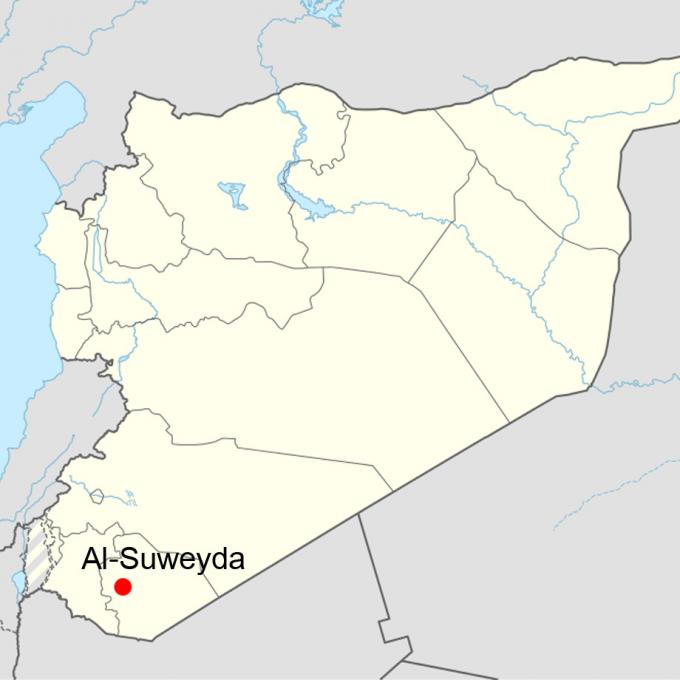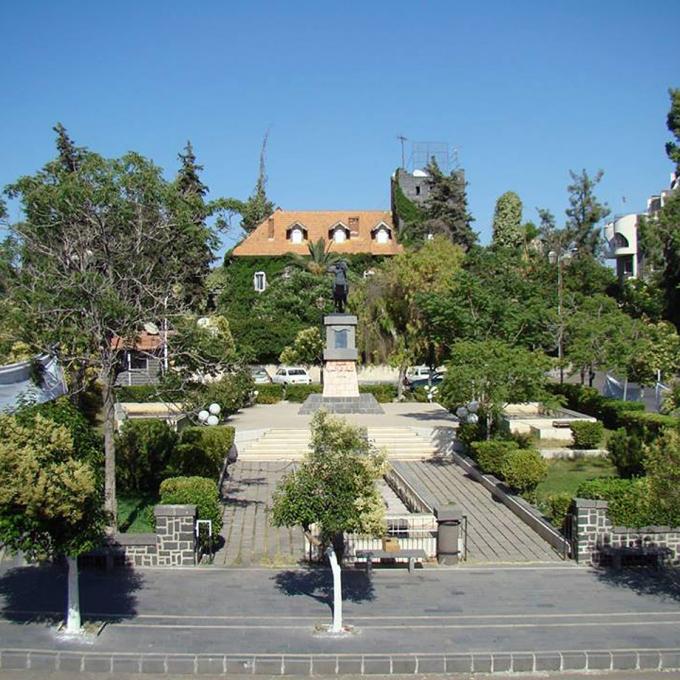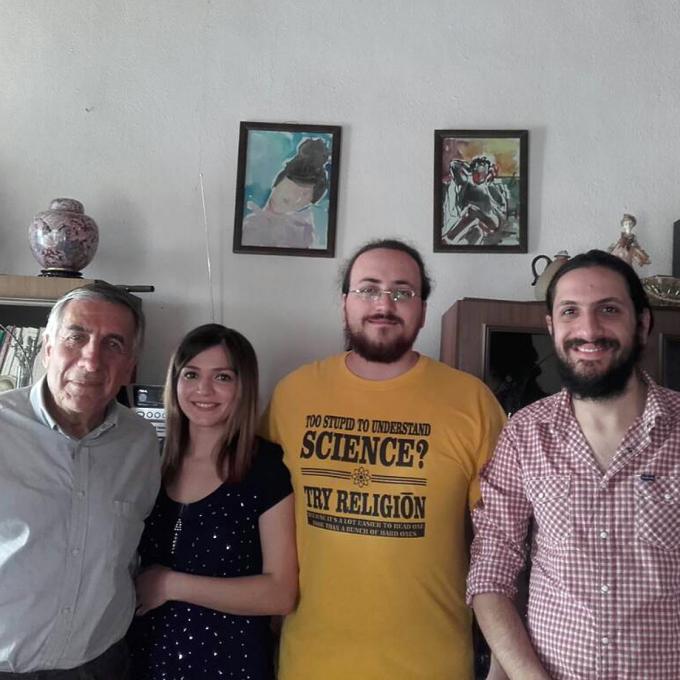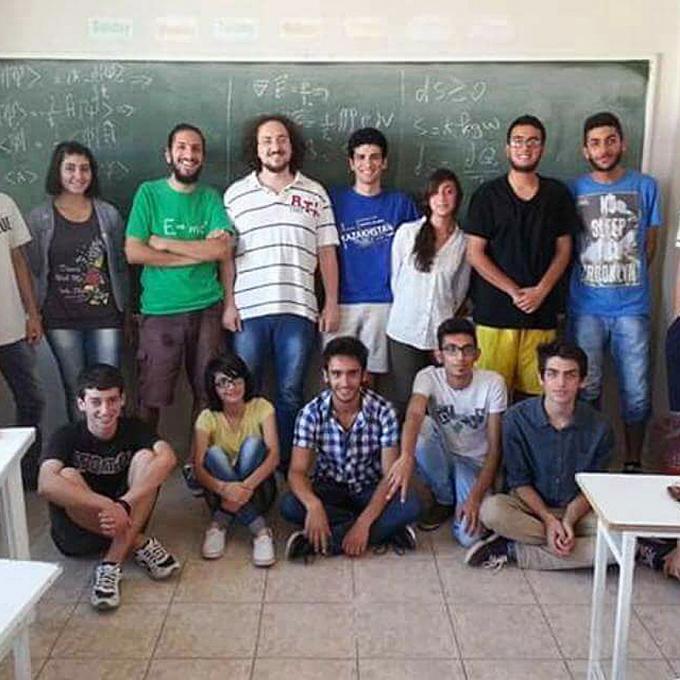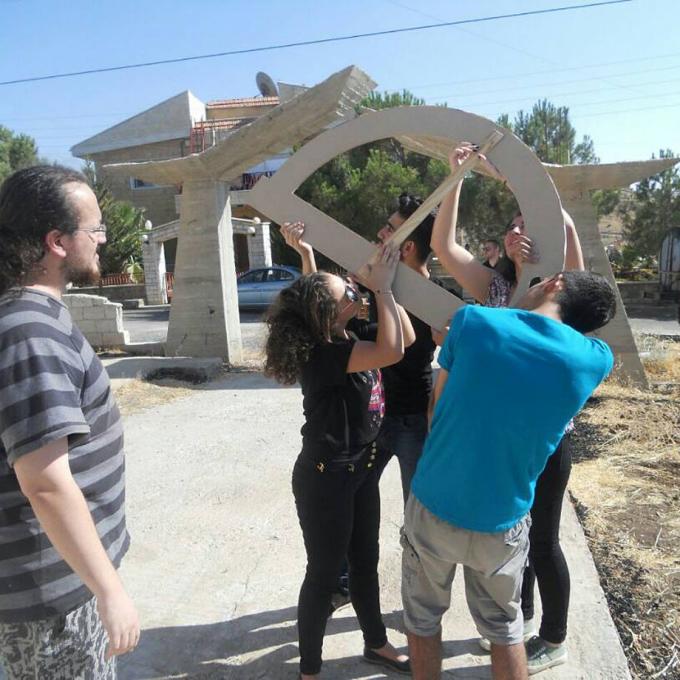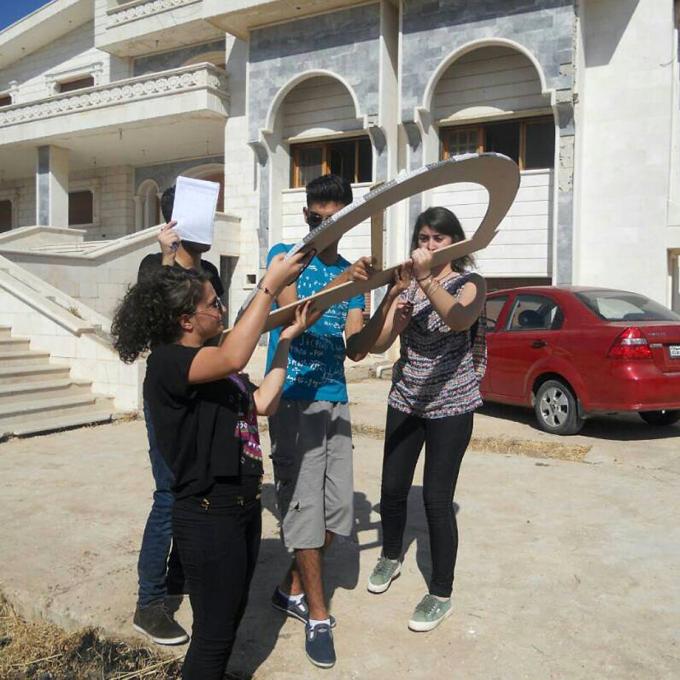On Creating an Island of Rational Thinking in a Martial Environment – An Interview with the Founders of the Center for Advanced Sciences (CAS) in Al-Suwayda, Syria
On Creating an Island of Rational Thinking in a Martial Environment – An Interview with the Founders of the Center for Advanced Sciences (CAS) in Al-Suwayda, Syria
FK = Fadi Klesli
PAR = Patrick Ritter
This article was initiated by our intern Fadi Klesli (24, from Damascus, Syria) who came to Germany as a refugee, in the fall of 2015. The article intends to show an underrepresented side of Syria in contrast to how it is portrayed through most media channels in Germany since the outbreak of the war, which are mainly focussing on the conflict and superior power relations, radical Islam or on the “refugee crisis” and its political aftermath in Europe. One aim is to exemplify that even under the threat of war, there is necessarily an everyday life within some Syrian cities and that there are progressive modern minds that are still active – in the described example, a self-organized scientific initiative of young people with the aim of spreading a very sincere message of a rational and a scientific way of seeing the world – not only in opposition to radical religious and nationalist thinking, but for the sake of science itself. The article is also aiming to make visible that within the times of war, there are still people who invest their passion and knowledge into the future of Syrian teenagers and young adults, enabling them to think critically and elaborate their basic tools for their future professions. The text is a summary of skype-talks and email exchanges between the authors Patrick Ritter and Fadi Klesli, both based in Bochum, Germany and Ammar Atrash and Raed Shaiia in As-Suwayda, Syria.
About the place: Al-Suwayda
Al-Suweyda is a small Syrian governorate with about 313.000 people, located on the southern border to Jordan. Before the beginning of the violent conflict in Syria, in 2011, the vast majority of the population in Suweyda was of Druze background, with a few Christians and a lesser percentage of Sunni Muslims. During the conflict, many Sunnis were migrating to Suweyda.
After the beginning of the violent events in Syria, the governorate and its capital, which is also called Al-Suweyda, has been a last resort for a lot of people from neighbouring cities in the Syrian conflict, because it is considered to be relatively safe. Before the onset of the violent conflicts, the religious authorities had no great control over the community. It was quite liberal in contrast to other Syrian communities. After the outbreak of the violent events in the country and the emergence of armed religious groups, religious reaction in the Druze community has developed as a result of the existential fear through the threat of war. It has led to the emergence of armed religious organizations within the community of Suweyda.
With the passage of the long years of war, and the expansion of armed groups in many areas, the city of Al-Suwayda has been surrounded by terrorist organizations such as Jabhat al-Nusra (Al-Nusra Front) and the Islamic State in the west and east respectively. Nevertheless, Suweyda is still under control under the Syrian government. There was not a very big uprising of the revolution in 2011 as in other Syrian cities and governorates. The current situation made it possible that a few progressive youth movements emerged, which turned away from religious or political radicalism, and one of them was searching for a necessary rational counter-position, which is the described initiative CAS – The Center for Advanced Sciences, founded by Raed Shaiia and Ammar Atrash, in 2014.
PAR: When FK told our team about your project for the first time, I guess there were some reactions of wonder and disbelief in our faces. Why would someone in a war-torn country like Syria try to establish a “Center for Advanced Sciences”? This sounds very ambitious, courageous and a bit crazy from our naive outside perspective, if I may say so. What was your motivation to start such a project and what are its goals?
Raed: Let’s first talk about our major objectives. In a country like Syria, there is widespread scientific illiteracy. We want to contribute in raising the general consciousness within society and spread a scientific way of thinking to eliminate ignorance, sectarian hatred, superstition and pseudo-science, which are all rampant in countries that do not have proper scientific education (for instance, Neuro-linguistic programming, also known as NLP which is an infamous pseudo-science, is ironically being taught in one of the institutions we used to teach at, and we had great dispute with the owners of the institute over teaching it, sadly, they are still teaching it to this day, because they consider it to be good business). In addition, we want to contribute in the global scientific advancement through achieving continuous new and original research. Moreover, what is truly genuine about the project is that it teaches relatively young students, starting from 14 years old, some of the most advanced topics in theoretical physics, for example general relativity and the standard model of particle physics.
FK: How is your current situation in Al-Suwayda, politically and in matters of security?
Raed: It is not a super safe place. It is relatively safe, compared to other cities. It is a small city, and it cannot take many people to live in. There are no rivers, no resources to sustain a lot of people. The safe zones in Syria are quite small. People didn’t uprise against the regime in this governorate, mainly because they fear radical Islam, although they are not mainly pro-regime, instead, they are “pro-state”, if I may say so. The problem is, there is much sectarian and regional hatred around. That is a big problem. And that’s why we try to promote rational thinking in our project. It is not a luxurious situation at all. But we live with it at the moment.
Ammar: Yes. Suwayda is a good place for us to work. People are not that religiously committed in Suwayda, not as much as around. The armed conflict has not reached the city, only at the outlines of the governorate in the east and the west. Only lately, the death rate and number of kidnappings were rising. But that doesn’t affect us that much in the city itself at the moment, fortunately.
FK: And how do people in the city react to you? Earlier, you wrote about rumours and death threats.
Ammar: The conflict that affects us the most, is the struggle between progressiveness and non-progressiveness. There was in the beginning a bad rumour about us, that people said we were teaching atheism, which is not true but rather a huge misconception. The point is, whether you believe in god/gods or not, is irrelevant: it just doesn’t matter in a physical experiment or during a mathematical calculation. You cannot teach someone to be an atheist, you can just expose them to facts. We are teaching the scientific method, mathematics, critical thinking and logic. We can’t even say there is no god or that science has disproved it (but of course, it most certainly hasn’t proved it either). That’s not our job and not our intention. And it wouldn’t be true as well. Science doesn’t tell you that there is no god. Science tells you that the god hypothesis is irrelevant to any scientific endeavour. Students who are coming to our courses are usually very smart. We have many clever students. And of course, they are asking very deep existential questions. The vast majority of them are atheists. But that’s not because we teach them to be. In fact, most of them were atheists even before we met them. They are thinking about the universe, God and all that. And since they ask us about it, we have to present the scientific point of view: the existence of god is irrelevant.
Raed: Coming back to the rumours. It was a bit crazy, actually. Some people were claiming we were freemasons and illuminati, because we were teaching math and physics. So, we received death threats by some fanatics. But that’s under control now. And we are much more understood and respected, since people realized how valuable our work is – through the results they had started noticing on our students.
PAR: Could you please say something about how the Center is structured? Where do you teach? How does it look like?
Ammar: At the beginning, we started a trial class with Jozour, a local organization. And later we partnered with local youth organizations and private institutions, like Balquees (whom we were introduced to by our friend Osama Karkout, a KAIST physics student, who also taught in the center for a short time) and MAPS (they give us a place to teach at and we provide the curriculum and the teachers. But mainly, we are in the process of establishing a full studying program of several years in all natural sciences.
Raed: Currently, we are only teaching mathematics and physics. We had included two more courses in the center: evolutionary biology, taught by Hasan Atrash (a biology graduate), and chemistry, taught by Shurouq Zaitoun (a pharmacist). Unfortunately, we had to cancel those two courses due to our students’ tight schedule, because they also have to attend their public schools. The curriculum, which was authored by me, consists of five levels. The first level spans for one and a half years, the second: eight months, the third: one year, the fourth: nine months, the fifth and the last: five months. The first level consists of pure mathematics, both basic and advanced (other than one course which includes two subjects: the scientific method & critical thinking, and logical fallacies). For the second, the third and the fourth levels, they include courses in physics and mathematics. Finally, the last level includes pure theoretical physics courses. The targeted group is individuals whose age exceeds 14. With exceptions for younger students under the condition that they have finished a preliminary course which curriculum I have also authored. So far, we were teaching about 150 students in 13 classes.
FK: Who are the teachers?
Raed:. When I first suggested the idea to Ammar, we started working on the curriculum alone, with small financial aid from Shurouq, then Osama, Shurouq and Mr. Hasan joined us in teaching before Osama had to leave to South Korea, and before we had to cancel the Biology and Chemistry courses. Since then, Ammar and I have been the only teachers in the center and so far, we only trust each other in matters of Physics and Mathematics. In Syria, many people who have earned high degrees, only memorize during their studies in collage the information that help them passing their exams and getting their diploma. Furthermore, many don’t even know the logical structure of most scientific theories in their own fields and have quite weak mathematical abilities in general.
Ammar: However, we encourage our students to go to universities, study and get a certificate, so they can find jobs and establish their careers in the future, because so far, we have been unable to provide certificates for our students. But we are doing our best in that direction. We really trust in what our students are doing. And it’s possible that one day some of them might work with us or even replace us.
PAR: How successfully can you work with your limited resources? You wrote you don’t have a big laboratory, only a rent seminar room. How can you generally teach such advanced material under these weak conditions?
Raed: With much success, actually. After only several months, many students are showing significant progress. For example, some of them were working on their own on the existence and the known properties of tachyons. And all of them have made measurements of the relative distances between the sun, the Earth and the moon, and for the relative sizes of the sun and the moon, and produced relatively sound results, considering the somehow primitive instruments they had made.
Ammar: Moreover, several teachers from local schools have admitted that the students have surpassed them by long shots in mathematics. Which drove some of the teachers to sign up to study in our center. The preceding accomplishments were also taken up by local media with very positive reports. In addition, local NGOs now consider the center to be the only trusted local scientific authority, and are aiming to work with us throughout Syria, and even some of them have suggested expanding the cooperation to include regions outside of Syria.
[During this section of the interview, the internet connection broke down several times, due to the weak electronic system in Sweida since the outbreak of the war]
Ammar: The best scenario with electricity at the moment is: three hours of electricity and three hours of stone age [laughing].
Raed: In winter time this becomes worse. One and a half hours of electricity and 4 and a half hours of darkness. […] To come back to your question: We do these kinds of experiments, in which our students can build relatively primitive tools by themselves and go out into nature to do those experiments. All they need is wood and a ruler and these kind of things. Actually, they came up with somewhat acceptable results considering how primitive their tools were, for example in measuring the radius of the sun and the moon, their relative distances and their distances to the earth. A great thing is that the students were also very proud, when they built the measurement tools themselves. But regarding more advanced topics, since we mainly focus on mathematics and theoretical physics, all we need is a board and our minds.
FK: Which teaching material do you use?
Ammar: Raed collected a lot of the material from top ranking universities like Harvard, MIT, Yale, Oxford, Cambridge etc. And he put and simplified proofs for the overwhelming majority of theorems in the curriculum in a way that can be understood by every student, as well as writing complete courses in different subjects in mathematics from scratch. And I helped with laying out and the writing of the lectures.
Raed: In fact, I also well prepared Ammar for teaching some of these topics, and this process is still going on. So he is able to teach more advanced topics with each new class. Two of several books we use as references to the curriculum of levels 1 & 2 are these: “Calculus: One and Several Variables”, 10th edition (2007), by Salas, Hille and Etgen as well as “The Elements of Physics” by Grant and Phillips (2001).
FK: Are there plans to make the project bigger and/or working with the government? Do you hope for or work on connections towards other institutions or universities?
Raed: Our project is not a local project. It’s not even our idea to keep it only in Syria. But when we see the monopoly of the stakeholders at some universities over education and the way they hold back science on many occasions, we feel very grateful and very satisfied that we only teach science for the love of science, so we have a tendency of staying somewhat independent. And when you see a 14 year old student watching an MIT lecture on YouTube and getting bored, because he or she knows so much more than what he or she is watching in the lecture, you know that your work was not in vain! Our wish is that this self-organized way of teaching will spread widely.
Ammar: You know, Syria is a small country. It is easy to know a lot of people in other cities who know people who might be able to help us. This is how we got introduced to a company in Damascus lately and were offered partnership to open a class there. Unfortunately, due to many complications, the project was cancelled. Except for “Jozour” all our partners were private companies, no governmental institutions. And we hope to grow that way. But our marketing skills are pretty bad actually [both laughing].
PAR: Did you ever think about leaving Syria as well, as many other people did and why didn’t you?
Raed: Yes. Before we started this project, I thought about leaving the country in order to continue studying to get a PhD at a good university. My friend Osama Karkout got me a good offer at KAIST University, but I rejected it for the time being to focus on my work here, however, I think about leaving at some point to get my PhD. As soon as I get it, I’m going back to Syria to continue my work. Since we started this project, we realized that there is still hope here. I also had the idea that Europe, the US, Canada and other advanced countries are not short on scientists: they have many. But Syria, the Middle East and third world countries in general are in need of scientists. Ignorance is actually killing people. We have a responsibility to act against it.
Ammar: In Syria, you grow up with the idea that one day you will leave this country and live your life somewhere else, but after our work, I overcame this idea and decided to stay here. I quit college. So I need to get a certificate soon. I probably have to go outside of Syria and come back to continue the project. That’s my plan so far. But also what is not encouraging about studying and doing science abroad is: the sometimes referred to as “publish or perish” policy. The journals and a lot of institutes are private companies. They are dictating what the researchers have to do. Funders are influencing scientists to develop certain subjects in some branches of science in order to feed their industries and expand their market, or else the researchers might lose their jobs. Researchers waste too much time begging funders to get grants for funding their research. Both of us are very critical of these practises. Science should be practised for the love of science and for the development of our civilization. Under the circumstances we work in, we don’t suffer from these problems I have mentioned.
Raed: Sadly though, despite the hard conditions we find ourselves in and the many challenges we face to continue our work and spreading our message, we still have no official recognition, which makes our task even harder.
Ammar: Nevertheless, a valuable thing we experience with our students (which happens to be the most important improvement we have accomplished so far) is that we have succeeded in training them to think for themselves. In fact, we get so much positive feedback from students and even their parents concerning this matter.
Raed: Indeed, their parents sometimes say their children have completely changed. Now they are using this knowledge and this way of thinking in every aspect of their lives. We are feeling very grateful about that.
PAR: What is your vision for the time after the fundamental crisis in Syria?
Ammar: Considering our academic work, it is maybe obvious that we say: The most fundamental change we can think of in our society can only be reached with the help of science.
Raed: I think, most people in Syria have learned in the hard way how dangerous sectarian hatred, scientific illiteracy and close mindedness towards others can be. This makes me optimistic about the future of Syria and I think our project, which started a wave of rationality for others to follow, will continue to spread its message in harmony with other waves of rationality that are starting to hit Syrian shores.
PAR: Following your argumentation, progress in natural sciences is able to change our ideas of sociality – in which way do you think developments in natural sciences are able to improve our societies?
Ammar: An interesting thought. I think, any development and progress in the field of renewable energy for example would have excellent effects on the way we think and live. It would reduce our dependence on fossil fuel and coal so that we can preserve the planet. It is so important that this development is growing quickly all around the world – and not only in the west. If we could continue to preserve our civilization for several hundreds of years longer than we are currently estimating, this would change the way we think and act significantly.
Raed: I think that the most important aspect of natural sciences is the scientific method itself, just imagine that every assertion about the structure of the state or about society is not accepted, unless it is falsifiable and can be experimentally verified, and that people are always ready to discard their false beliefs if they are faced with contradicting data. Just think how much conflict could be avoided and how fast civilization would advance. That’s why we have to spread the scientific way of thinking and raise consciousness about its importance.
PAR and FK: Thank you very much for this encouraging interview!
--
Raed M. Shaiia was born in Suwayda, Syria, in 1984. He studied physics at Damascus university and taught himself in theoretical physics, mainly from the courses of Cambridge university and Stanford university. Raed has published a paper in quantum mechanics titled “On the Measurement Problem” and is working on matters related to quantum mechanics in curved space-times and on matters of economy, related to income distribution. He is also a blogger and a writer in some cultural and political journals. He is the founder of the “Scientific Agnostics Society” and has been a teacher and founding member in the Center for Advanced Sciences, since 2014.
Ammar H. Atrash was born in Suwayda, Syria in 1993. He studied mechanical engineering in Tishreen university for three years and studied Translation at Damascus university for two years. Taught partially in theoretical physics and extensively in mathematics by Raed Shaiia, he is a teacher and a founding member in the Center for Advanced Sciences, since 2014.



